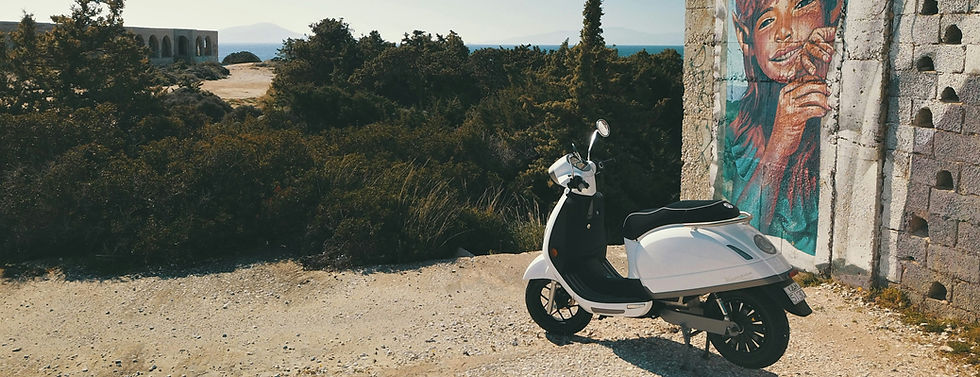.jpg)
The BOOST project allowed us to onboard 50 young interns—26 of them women—into engineering, sales, finance and operations”
Givens Minta Manu
Impact Story - Ghana



Meet Givens Minta
Givens Minta Manu is an advocate for women in Ghana’s e-mobility sector. At Solar Taxi, she is Chief of Staffl and heads the BOOST internship programme, helping young women gain hands-on skills and confidence to shape the future of clean transport.
Early advocacy
Leadership at Solar Taxi
Inspiring future changemakers
"Don’t underestimate the value of structured internships, especially for young women. When given the tools, mentorship, and opportunity, women can thrive in technical roles and become powerful change agents in the clean mobility sector."
"One standout story is Cecelia, a young woman who joined as an EV maintenance intern. Before the internship, [...] she doubted her ability to thrive in a male-dominated field. During her time at Solar Taxi, Cecelia was mentored by senior female engineers, [...] and even led a successful prototype assembly. Today, she is employed full-time."
"We’re seeing a shift: women are becoming EV engineers, entrepreneurs, and policy advocates. If we continue to break barriers and create intentional support systems, the next generation of clean mobility will be both sustainable and inclusive. "
Solar Taxi and BOOST partnership =
Skill-Building Through Internships
Empowering Women
Growing Innovation Culture

Read the full story
How Solar Taxi and BOOST are opening technical careers for women in Ghana
Solar Taxi’s e-mobility workshop in Accra offers a clear view of change: women now share the floor, maintaining battery packs, fine-tuning electric drivetrains and leading prototype builds. Enabled by the BOOST internship track, 26 female trainees have moved into roles once seen as out of reach—progress that, in the words of Chief of Staff Givens Minta Manu, is “reshaping how we hire and how we innovate.”
The company and the challenge
Solar Taxi, founded in 2018, covers three core e-mobility fronts:
-
Vehicle design and assembly – electric bikes, tricycles and mini-cars
-
Fleet sales and rentals – e-cars and two-wheelers for businesses and individuals
-
Battery engineering – production, maintenance and recycling of lithium-ion packs
Alongside its commercial work, the firm runs Female Engineers and Riders Academies that introduce young people, especially women, to hands-on EV skills. Although, technical roles in Ghana remain heavily male. “Training fees, stereotypes and the absence of mentors still keep many women out of the workshop,” notes Givens Minta Manu, Chief of Staff.
Partnership in practice: BOOST arrives
To move beyond one-off training, Solar Taxi joined BOOST, a skills-development programme coordinated by UEMI. “The BOOST project allowed us to onboard 50 young interns—26 of them women—into engineering, sales, finance and operations,” Givens explains. “That influx of fresh talent increased our capacity and accelerated innovation.”
The centrepiece is a structured internship-to-employment track. Trainees rotate through departments, pairing hands-on tasks with mentoring from senior staff—especially female engineers—so learning stays practical and visible.
“The programme created a more diverse and dynamic work culture that continues to shape our hiring,” notes Givens Minta Manu. She sees Solar Taxi evolving from an e-mobility firm into “a learning and growth hub for young professionals in Ghana.”
Learning by doing and leading
Professional growth inside the BOOST track is rooted in practical tasks: fitting drive trains, analyzing battery data, balancing ledgers for fleet leases. Personal growth often follows. Interns speak of new confidence in teamwork and leadership, especially those who had never worked in a structured company before.
Cecelia’s route is emblematic. Entering with minimal experience, she was mentored by senior female engineers, helped assemble a live prototype and ultimately led its final inspection. Steady income now pays for her mother’s medical care and her siblings’ school fees, while her presence in the workshop encourages local schoolgirls to consider technical careers.
Early results at a glance:
-
50 Interns trained
-
26 Women interns
These figures are modest in absolute terms but significant for a sector where female representation has been slow to materialize.
A company in transition
Structured internships have prompted Solar Taxi to formalize mentoring, refine talent evaluation and document processes that once relied on informal hand-offs. The payoff is tangible: faster knowledge transfer, greater operational capacity, and a pipeline of employees already aligned with company culture.
Givens distil the lesson succinctly: “When women are given the tools, mentorship and opportunity, they don’t just take part; they improve the way we work.”
Looking ahead
The next step is permanence. Solar Taxi intends to embed the internship pathway as company policy, extending it to every department and linking it to long-term career planning. The wider ambition, shared with BOOST, is a gender-balanced clean-mobility landscape in Africa—one where women shape technology as engineers, guide strategy as managers and drive innovation as entrepreneurs.